

Feeling stressed is perfectly normal, at which sometimes, being stressed-out helps and motivates one to focus at work, yet at other times, it will be overwhelming making it difficult to concentrate on anything.
It is important to identify different types of stress and how one manages it into a motivation factor.
3 Types of Stress and Health Hazards - Shawna Freshwater, PhD. Stress is a feeling that people have when they are struggling to cope with challenges related to finances, work, relationships, environment, and other situations.
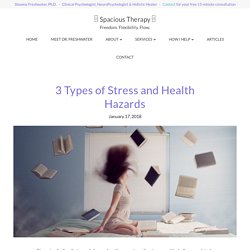
Moreover, stress is felt when an individual perceives a real or imagined challenge or threat to a their well-being. People often use the word stress interchangeably with anxiety, feeling anxious, fearful, nervous, overwhelmed, panic, or stressed-out. Stress is the body’s natural defense against real or imagined danger. It flushes the body with hormones to prepare systems to evade or confront danger. This is known as the “fight-or-flight or freeze” response. The body is an intelligent operating system, but the body can not determine the difference between life threatening external threat from imagined or perceived non-life threatening stressors.
Types of Stress. Stress is your body's response to certain situations.
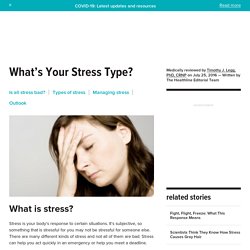
It’s subjective, so something that is stressful for you may not be stressful for someone else. There are many different kinds of stress and not all of them are bad. Good Stress, Bad Stress - ULifeline. Feeling stressed can feel perfectly normal, especially during exam time.

You might notice that sometimes being stressed-out motivates you to focus on your work, yet at other times, you feel incredibly overwhelmed and can’t concentrate on anything. While stress affects everyone in different ways, there are two major types of stress: stress that’s beneficial and motivating — good stress — and stress that causes anxiety and even health problems — bad stress. Here’s more on the benefits and side effects of stress and how to tell if you’re experiencing too much stress. Benefit of Stress According to experts, stress is a burst of energy that basically advises you on what to do. Psychological Stress: Symptoms, Causes, Treatment & Diagnosis. Stress.
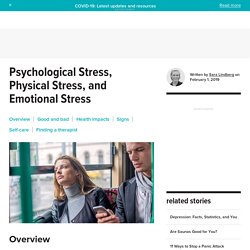
It’s a four-letter word that many of us dread. Whether it’s a tense interaction with a boss or pressure from friends and family, we all face stressful situations from time to time. For some of us, these events happen sporadically. For others, daily stress is a regular part of life. There’s a good chance we can all identify negative stress, but did you know that stress can also be positive? Good stress, called eustress, can actually be beneficial to you. 3 Rules for Turning Stress Into Success. Stressed?

Author and speaker Denis Waitley shares three guidelines to transform negative anxiety into positive success. Follow these rules and take action now to let go of your stress. Related: 11 Strategies for Managing Stress 1. Accept the unchangeable. Everything that has happened in your life to this minute is unchangeable. Grudge collecting, getting even, harboring ill will and vengeful thinking do no good. By forgiving your trespassers—whoever or whatever they are—you become free to concentrate on going forward with your life and succeeding in spite of those detractors. Action idea: Write down on a sheet of paper things that happened in the past that bother you. 2. Change your reaction to what others say and do, and you can control your own thoughts and actions by dwelling on desired results instead of the penalties of failure. The only real control you have in life is your immediate thought and action. Stress Symptoms: Physical Effects of Stress on the Body.
17 Highly Effective Stress Relievers. From minor challenges to major crises, stress is part of life.
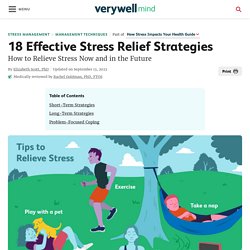
And while you can't always control your circumstances, you can control how you respond to them. Easy Recipes, TV Shows and Videos. Diet for Stress Management: Carbs, Nuts, and Other Stress-Relief Foods. IMAGES PROVIDED BY: (1) Jon Bradley / Stone / Getty Images (2) FoodCollection / Photolibrary (3) Vincenzo Lombardo / Photodisc / Getty Images (4) Martin Harvey / Photodisc / Getty Images (5) Medioimages / Photodisc / Getty Images (6) Nancy R.

Cohen / Photodisc / Getty Images (7) Peter Howard Smith / StockFood Creative / Photolibrary (8) DEX IMAGE / Getty Images (9) Frank Krahmer / Digital Vision / Getty Images (10) Thomas Barwick / Photodisc / Getty Images (11) Achim Sass / Westend61 / Getty Images (12) David Murray and Jules Selmes / Dorling Kindersley / Photolibrary (13) Rose - Mueller / Stock4B / Photolibrary (14) Diana Miller / Stone / Getty Images (15) Emilio Ereza / age fotostock / Photolibrary (16) Purestock / Getty Images American Council on Exercise: "Exercise Can Help Control Stress. " Bertone-Johnson, E. Archives of Internal Medicine, June 13, 2005. Cleveland Clinic: "The Power of Fish. " Colorado State University Extension: "Diet and Hypertension. " Gebauer, S. Thys-Jacobs, S. 11 Signs and Symptoms of Too Much Stress. Stress is defined as a state of mental or emotional strain caused by adverse circumstances.
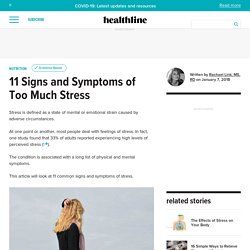
At one point or another, most people deal with feelings of stress. In fact, one study found that 33% of adults reported experiencing high levels of perceived stress (). The condition is associated with a long list of physical and mental symptoms. This article will look at 11 common signs and symptoms of stress. Acne is one of the most visible ways that stress often manifests itself. When some people are feeling stressed out, they tend to touch their faces more often. Several studies have also confirmed that acne may be associated with higher levels of stress. One study measured acne severity in 22 people before and during an exam. Another study of 94 teenagers found that higher stress levels were associated with worse acne, especially in boys ().
These studies show an association, but don’t account for other factors that may be involved. Warning Signs of Emotional Stress: When to See Your Doctor: Symptoms, Relief.